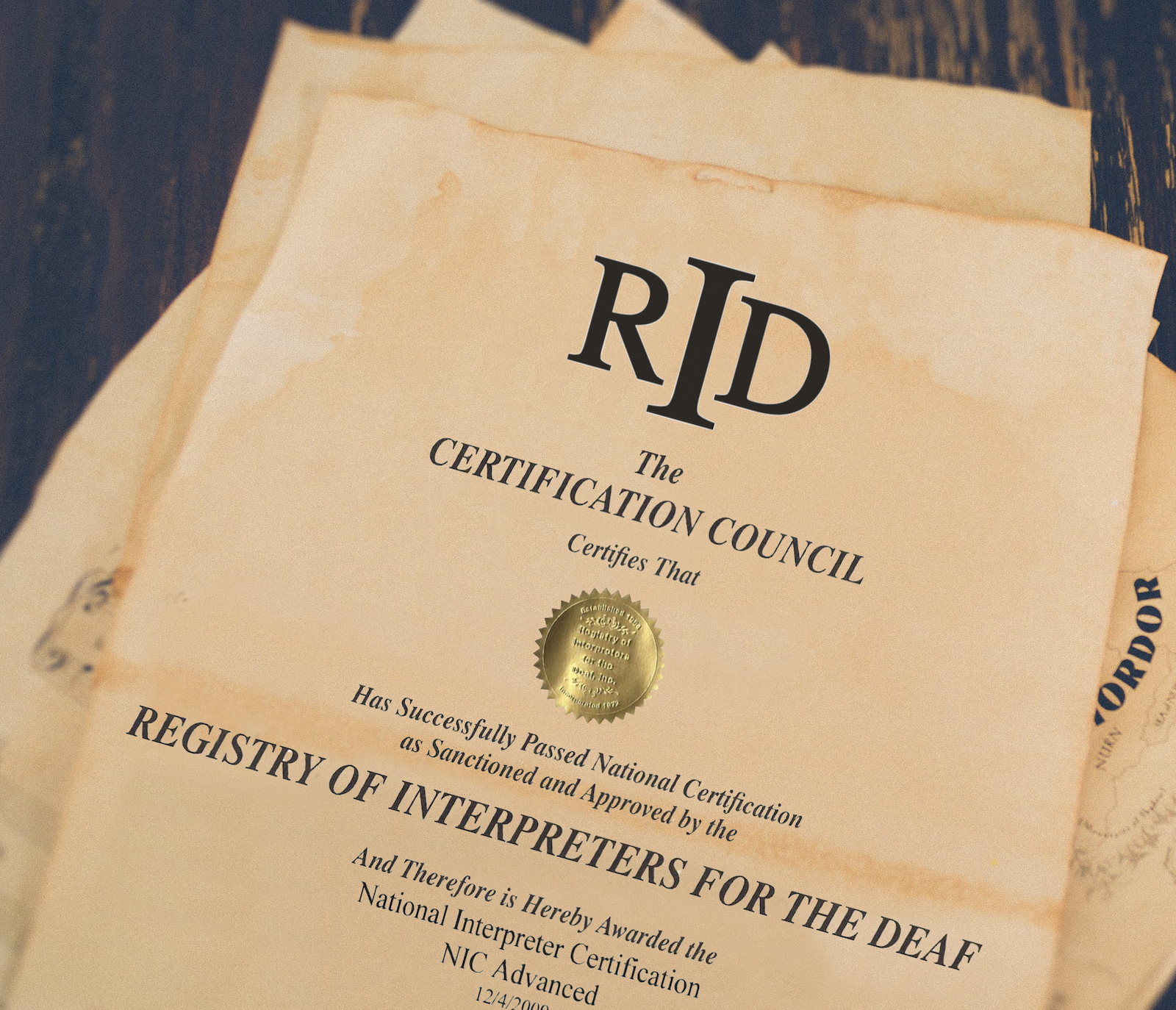Why is RID Certification Valuable?
Our certifications provide a recognized standard of effectiveness in the sign language interpreting profession. It demonstrates to employers, customers, and peers that the individual has achieved a rigorous baseline level of knowledge, skills, and experience.
RID’s certifications can open doors to new job opportunities and career advancement. It may be a requirement for certain positions or assignments and can also lead to increased earning potential.
RID requires individuals to expand and maintain their knowledge and skills through ongoing education and training. This requirement helps our members stay current with industry trends, improve their job performance, and foster personal growth and development.
RID’s certifications provide a level of credibility and trust with customers, stakeholders and the public. It assures them that the individual has met the baseline standard of effectiveness and quality. Our members must demonstrate a commitment to ethical conduct and ongoing professional development to remain certified.
Being certified helps to standardize practices and procedures within the sign language interpreting profession. The standardization promotes consistency and quality and helps to ensure that individuals working in the field are held accountable for their provision of services.
Holders of both the NIC, available since 2005, and CDI certification, available since 1998, have demonstrated general knowledge in the field of interpreting, ethical decision making and interpreting skills. Candidates earn NIC Certification if they demonstrate professional knowledge and skills that meet or exceed the minimum professional standards necessary to perform in a broad range of interpretation and transliteration assignments.
Holders of this certification are hearing and have demonstrated general knowledge in the field of interpreting, ethical decision making and interpreting skills. Candidates earn NIC Certification if they demonstrate professional knowledge and skills that meet or exceed the minimum professional standards necessary to perform in a broad range of interpretation and transliteration assignments. This credential has been available since 2005.
Holders of this certification are deaf or hard of hearing and have demonstrated knowledge and understanding of interpreting, deafness, the Deaf community, and Deaf culture. Holders have specialized training and/or experience in the use of gesture, mime, props, drawings and other tools to enhance communication. Holders possess native or near-native fluency in American Sign Language and are recommended for a broad range of assignments where an interpreter who is deaf or hard-of-hearing would be beneficial. This credential has been available since 1998.
Each RID credential has unique requirements that must be completed before it can be awarded. Some certifications involve passing a series of exams and others involve submitting documentation of training and experience. In all cases, if the candidate is determined to meet or exceed RID’s national standard, they are awarded certification. Detailed information about these requirements can be found on the corresponding certification page.
There are specific conventions and a hierarchy of how you should display your certifications. Please see the information below:
- Valid generalist certifications no longer offered (IC, TC, CSC, MCSC, RSC, ETC, EIC, OIC, CI and/or CT, OTC, NIC Advanced, NIC Master) appear before all others. IC and/or TC appear first (e.g. IC/TC, CSC).
- OIC certifications appear directly after all other old generalist certifications (e.g. TC, CSC, OIC:C)
- Current generalist certifications (CDI, NIC) appear after generalist certifications that are no longer offered (e.g. IC, CI and CT, OTC, NIC)
- NIC certification appears after the CI and/or CT
- The OTC certification appears after the NIC certification
- Specialist certifications (SC:L and SC:PA) appear after all generalist certifications
- NAD certifications appear after all RID certifications
- Ed:K-12 appears after NAD certification
- CI and CT are always expressed together as “CI and CT” or “CI & CT”
Follow this hierarchy:
IC, TC, IC/TC, CSC, MCSC, RSC, ETC, EIC, OIC:V/S, OIC:S/V, OIC:C, CI, CT, CI and CT, CDI, NIC, NIC Advanced, NIC Master, OTC, SC:PA, SC:L, NAD III, NAD IV, NAD V, Ed:K-12
If you have a college degree from an institution that is accredited by the US Department of Education and would like to submit proof to RID that you meet the educational requirement, visit our Available Certification page to learn more: https://rid.org/certification/available-certifications/
To request verification of your certification, please complete and submit this form. Note that the Certification Department has gone paperless and is no longer accepting submissions mailed to HQ. Submissions mailed to HQ will not be processed.


Certification reinstatement is the process of reinstating an RID certification(s) that has been revoked due to either failure to comply with the CEU requirement, or failure to pay membership dues by July 31st. Please read below to determine if you are eligible for certification reinstatement as well as the required steps to take to request reinstatement.
The Certification Maintenance Program (CMP) is the vehicle used to monitor the continued skill development of certified interpreters. Certification maintenance is a way of ensuring that practitioners maintain their skill levels and keep up with developments in the interpreting field, thereby assuring consumers that a Certified interpreter provides quality interpreting services.
To take advantage of the Continuing Education Center, you will need to be an Associate, Certified, or Student member of RID. For assistance, contact webinars@rid.org. If you are a current member, you have received email instructions from RID with your log-in information for the Continuing Education Center.
To request verification of your certification, please complete and submit this form. Note that the Certification Department has gone paperless and is no longer accepting submissions mailed to HQ. Submissions mailed to HQ will not be processed.
Certification reinstatement can be needed for a multiple of reasons, and may be requested via an official RID form.
Click here to learn more about submitting a reinstatement request.
If you do not hold the necessary degree to take your exam, you may apply for the Alternative Pathway Program. The Alternative Pathway Program consists of an Educational Equivalency Application which uses a point system that awards credit for college classes, interpreting experience, and professional development.
You may submit this documentation…
- by emailing certification@rid.org
- by logging into your RID member portal and clicking on “Upload Degree Document.”
*RID Certification Department is going paperless! When we receive your completed application, we will email you with instructions for submitting payment online through your member portal.
*Once your application has been reviewed and approved, you’ll receive an email notification that your account has been updated. The standard processing time is 7-14 business days.
At the 2003 RID National Conference, in Chicago, IL, the membership passed motion C2003.05, establishing degree requirements for RID certification candidates.
The motion stated the following related specifically to the CDI Performance Exam: Effective June 30, 2016, Deaf candidates must have a minimum of a bachelor’s degree. However, due to the moratorium, the RID Board of Directors has determined the following adjustment to the implementation to the CDI Performance Exam Educational Requirements: The moratorium began six (6) months before the implementation of the Bachelor’s degree requirement for the CDI Performance Exam (set to be implemented on July 1, 2016). To allow individuals who do not have a degree a fair opportunity to take this exam before the requirement changes, the RID Board of Directors has determined that six (6) months will be added to any date that is established for ending the moratorium on the CDI Performance Exam. For example, if the new CDI Performance Exam is launched July 1, 2018, individuals will have until January 1, 2019, to meet the BA requirement or alternative pathways to eligibility.


Testing at CASLI.
CASLI, LLC, was created by RID to serve as a separate testing entity charged with the administration, maintenance, and development of exams that RID uses for their two certification programs; The National Interpreter Certification, or NIC, which is awarded to ASL-English interpreters who are hearing, and the Certified Deaf Interpreter, or CDI, which is awarded to ASL-English interpreters who are Deaf.
CASLI, LLC, operates separately from RID, with their own Board of Managers and testing committee, however, RID remains CASLI’s sole owner and shareholder and CASLI remains RID’s sole testing entity that administers national ASL-English interpreter certification exams.
This is a very basic checklist for our exam candidate to navigate through taking their exams
- Skills – Acquire the skills and knowledge that our exams are assessing
- Requirements – Meet all exam eligibility requirements listed here
- Create an Account – Create an account within RID’s member portal (an RID ID number is required) and an account within CASLI Exam System
- Exam for Purchase – Request an exam for purchase, contact CASLI with any accommodations requests.
- Pay for Exam – Once CASLI staff verify your eligibility and an exam is manually added to your account for purchase, pay for your exam
- Prepare – Read and utilize the CASLI Exam Content Outline and Preparation Guide
- Read Relevant Materials – Read any relevant CASLI web pages regarding the knowledge exams or the performance exams, as well as, any bridge plan or “gap” test
- Practice Sample Exams – Practice with the sample exams within CASLI Exam System to familiarize yourself with the user interface and navigation features
- Rest Up – Ensure all your physical, emotional, and mental needs are met in preparation for the exams (e.g. get enough sleep, practice stress/anxiety reduction techniques, etc.)
- Utilize Resources – Utilize the countless other resources and tips available to help you prepare for exams available on the internet!
When you’re ready
to take your exam, use this form to request an exam be added to your CASLI Exam System Account to be purchased. Once you have purchased and scheduled your exam, your next step will be to prepare for your exam day
If you plan to take the:
- CASLI Generalist Knowledge Exam
- Gap test and the CASLI Generalist Performance Exam
- CASLI Generalist Performance Exam
- NIC-Interview and Performance Exam
Request an exam (CASLI Staff will manually verify eligibility) and purchase through the CASLI Exam System.
If you have previously purchased an exam through the RID member portal and have credit for that exam in your RID account, use the request an exam form to have that credit transferred to the CASLI Exam System. Note: candidate are responsible to pay any differences in original purchase prices and the current exam price they are eligible for.
** The CDI and NIC-Knowledge Exam has retired as of January 1, 2021 and these exams are no longer administered.
After you have taken your exam it will take some time for your results to be reflected in your RID/CASLI Account. Once your results have come in, they will be uploaded into the RID/CASLI Portal and you will get an automated email, sent to the email address listed in your account, letting you know you can view your exam results. For information on the average results time, what your results mean, and what your next steps are, please view that specific exams “Exam Details” page.
If you did not pass your exam, you will have to wait the minimum required time before you will be able to purchase and take the exam again. Please know that the RID Portal /CASLI System will not allow you to purchase your retake until the waiting period has passed. If you have questions about a step in the process, please do not hesitate to contact us.
Certification Archives
Previously Offered RID Certifications
Previously Offered RID Certifications
These certifications were previously offered by the RID and are no longer administered. RID recognizes these certifications, however the exams for these programs are no longer available.
Individuals who achieved the NIC Advanced level have passed the NIC Knowledge Exam, scored within the standard range of a professional interpreter on the interview portion of the NIC Interview and Performance Exam and scored within the high range on the performance portion of the NIC Interview and Performance Exam.
Individuals who achieved the NIC Master level have passed the NIC Knowledge Exam and scored within the high range on both portions of NIC Interview and Performance Exam.
The NIC with levels credential was offered from 2005 to November 30, 2011.
Holders of this certification are recognized as fully certified in interpretation and have demonstrated the ability to interpret between American Sign Language (ASL) and spoken English for both sign-to-voice and voice-to-sign tasks. The interpreter’s ability to transliterate is not considered in this certification. Holders of the CI are recommended for a broad range of interpretation assignments. This credential was offered from 1988 to 2008.
Holders of this certification are recognized as fully certified in transliteration and have demonstrated the ability to transliterate between English-based sign language and spoken English for both sign-to-voice and voice-to-sign tasks. The transliterator’s ability to interpret is not considered in this certification. Holders of the CT are recommended for a broad range of transliteration assignments. This credential was offered from 1988 to 2008.
Holders of this certification have demonstrated the ability to interpret between American Sign Language (ASL) and spoken English and to transliterate between spoken English and an English-based sign language. Holders of this certification are recommended for a broad range of interpreting and transliterating assignments. This credential was offered from 1972 to 1988.
The MCSC examination was designed with the intent of testing for a higher standard of performance than the CSC. Holders of this certification were required to hold the CSC prior to taking this exam. Holders of this certification are recommended for a broad range of interpreting and transliterating assignments. This credential was offered until 1988.
Holders of this certification have demonstrated the ability to interpret between American Sign Language (ASL) and English-based sign language or transliterate between spoken English and a signed code for English. Holders of this certification are deaf or hard-of-hearing and interpretation/transliteration is rendered in ASL, spoken English and a signed code for English or written English. Holders of the RSC are recommended for a broad range of interpreting assignments where the use of a interpreter who is deaf or hard-of-hearing would be beneficial. This credential was offered from 1972 to 1988.
Holders of this certification have demonstrated the ability to interpret between American Sign Language (ASL) and spoken English. Holders received scores on the CSC exam which prevented the awarding of CSC certification or IC/TC certification. The interpreter’s ability to transliterate is not considered in this certification. Holders of the IC are recommended for a broad range of interpretation assignments. The IC was formerly known as the Expressive Interpreting Certificate (EIC). This credential was offered from 1972 to 1988.
Holders of this certification have demonstrated the ability to transliterate between spoken English and a signed code for English. Holders received scores on the CSC exam which prevented the awarding of CSC certification or IC/TC certification. The transliterator’s ability to interpret is not considered in this certification. Holders of the TC are recommended for a broad range of transliterating assignments. The TC was formerly known as the Expressive Transliterating Certificate (ETC). This credential was offered from 1972 to 1988.
Holders of this certification were required to hold the CSC prior to sitting for this examination and have demonstrated specialized knowledge in performing arts interpretation. Holders of this certification are recommended for a broad range of assignments in the performing arts setting. This credential was offered from 1971 to 1988.
Holders of this certification demonstrated both the ability to transliterate a spoken message from a person who hears to a person who is deaf or hard-of-hearing and the ability to understand and repeat the message and intent of the speech and mouth movements of the person who is deaf or hard-of-hearing. This credential was offered from 1979 to 1985.
Holders of this certification demonstrated the ability to transliterate a spoken message from a person who hears to a person who is deaf or hard-of-hearing. This individual received scores on the OIC:C exam which prevented the awarding of full OIC:C certification. This credential was offered from 1979 to 1985.
Holders of this certification demonstrated the ability to understand the speech and silent movements of a person who is deaf or hard-of-hearing and to repeat the message for a hearing person. This individual received scores on the OIC:C exam which prevented the awarding of full OIC:C certification. This credential was offered from 1979 to 1985.
Notice: RID has announced that a moratorium will be placed on new applications for CLIP-R Certification. For more information about the moratorium, please see this FAQ.
Holders of this conditional permit had completed an RID-recognized training program designed for interpreters and transliterators who worked in legal settings, and whom were also deaf or hard-of-hearing. Holders of this conditional permit were recommended for a broad range of assignments in the legal setting. This credential was available from 1991 to 2016.
Candidates were eligible for CLIP-R Certification if they were, at that time, a current RID CDI or RSC Certified member, met the experience requirements, had the proper letters of recommendation, and met RID’s educational requirement.
CLIP-R Certification Requirement
*Please note no substitutions could have been made to the requirements
- Must have been a certified member, in good standing, holding either the RSC or CDI.
- Must have met RID’s, at that time, educational requirement of an Associate degree or had an approved Educational Equivalency Application.
- Attached recommendation letters from two RID certified interpreters in good standing. At least one letter must have been from an SC:L certified interpreter. The other could have been from a CI and CT, CDI, CSC, NIC, or NAD.
- Verified at least 150 hours of training and/or mentoring as a legal interpreter. If an individual was unable to have all 150 hours in legal training or workshops, they must have had a minimum of 120 hours of legal interpreter training and up to 30 hours of mentoring in a legal setting with an interpreter, in good standing, who holds either the SC:L or CLIP-R. Verification was required in the form of RID CEUS (preferred) or legal trainings, or workshops. A certificate of completion or letter from the trainer/presenter/mentor was required to indicate the date, location, and duration of the training/mentoring.
NAD Certifications
NAD Certifications
These certifications were developed and administered by NAD and are recognized by RID.
In 2003, RID began to recognize interpreters who hold NAD III, NAD IV and NAD V certifications. These credentials were offered by the National Association of the Deaf (NAD) between the early 1990s and late 2002. In order to continue to maintain their certification, NAD credentialed interpreters must have had an active certification and registered with RID prior to June 30, 2005. These interpreters are required to comply with all aspects of RID’s Certification Maintenance Program, including the completion of professional development.
Holders of this certification possess above average voice-to-sign skills and good sign-to-voice skills. Holders have demonstrated the minimum competence needed to meet generally accepted interpreter standard. Occasional words or phrases may be deleted but the expressed concept is accurate. The individual displays good grammar control of the second language and is generally accurate and consistent, but is not qualified for all situations.
Holders of this certification possess excellent voice-to-sign skills and above average sign-to-voice skills. Holders have demonstrated above average skill in any given area. Performance is consistent and accurate and fluency is smooth, with few deletions; the viewer has no question to the candidate’s competency. Holders of this certification should be able to interpret in most situations.
Holders of this certification possess superior voice-to-sign skills and excellent sign-to-voice skills. Holders have demonstrated excellent to outstanding ability in any given area. The individual had minimum flaws in their performance and have demonstrated interpreting skills necessary in almost all situations.
RID Retired Certifications
RID Retired Certifications
The following RID certification have been retired. RID no longer supports or recognizes these credentials and individuals can no longer use them as validation of their abilities.
Holders of this provisional certification are interpreters who are deaf or hard-of-hearing, have demonstrated a minimum of one year experience working as an interpreter, have completed at least eight hours of training on the NAD-RID Code of Professional Conduct and have completed eight hours of training in general interpretation as it related to an interpreter who is deaf or hard-of-hearing. Holders of this certificate are recommended for a broad range of assignments where an interpreter who is deaf or hard-of-hearing would be beneficial.
Holders of this conditional permit completed an RID-recognized training program designed for interpreters and transliterators who work in legal settings. CI and CT or CSC certification was required prior to enrollment in the training program. Holders of this conditional permit are recommended for a broad range of assignments in the legal setting during the development of the SC:L certification. This conditional permit was retired on December 31, 1999.
Holders of this provisional certification hold CI and CT or CSC and have completed RID approved legal training. Holders of this certificate are recommended for assignments in the legal setting. This provisional certificate was retired in 1998.
Certifications Under Moratorium
Educational Certificate: K-12 (Ed:K-12)
Educational Certificate: K-12 (Ed:K-12)
This credential is fully recognized by RID, but the designation is no longer awarded by RID. This designation went into moratorium effective January 1, 2016.
The EIPA assessment is still available through Boys Town. More information on that can be found at http://www.classroominterpreting.org/eipa/.
Holders of this certification demonstrated the ability to interpret or transliterate classroom content and discourse between students who are deaf and hard of hearing and students, teachers and school staff who are hearing. Certificants demonstrated EIPA Level 4* skills using spoken English and at least one of the following visual languages, constructs, or symbol systems at either an elementary or secondary level:
- American Sign Language (ASL)
- Manually Coded English (MCE)
- Contact Signing (aka: Pidgin Signed English (PSE) or English-like Signing)
- Cued American English (CAE) (aka: Cued Speech)
This credential was offered from 2007 to 2016.
Specialist Certificate: Legal (SC:L)
Specialist Certificate: Legal (SC:L)
This credential is fully recognized by RID, but the designation is no longer awarded by RID. This designation went into moratorium effective January 1, 2016.
Description: Holders of this specialist certification demonstrated specialized knowledge of legal settings and greater familiarity with language used in the legal system. These individuals are recommended for a broad range of assignments in the legal setting. This credential was offered from 1998 to 2016.
The SC:L, and specialist testing in general, are topics of investigation as part of the 2016-2018 Certification Committee Scope Of Work.
Oral Transliteration Certificate
Oral Transliteration Certificate
This credential is fully recognized by RID, but the designation is no longer awarded by RID. This designation went into moratorium effective January 1, 2016.
Description: Holders of this certification demonstrated, using silent oral techniques and natural gestures and the ability to transliterate a spoken message from a person who hears to a person who is deaf or hard-of-hearing. Holders also demonstrated the ability to understand and repeat the message and intent of the speech and mouth movements of the person who is deaf or hard-of-hearing. This credential was offered from 1999 to 2016.
This credential was originally voted into sunset by the RID Board at the in-person Board Meeting at the RID NOLA National Conference, in August of 2015.
At the RID NOLA Business Meeting, a motion was made to move the credential from “sunset” status to “moratorium”. Here is the member motion:
FROM THE MINUTES OF THE 2015 BUSINESS MEETING:
C2015.11
Primary submitter(s) name(s): William Gorum
Secondary submitter(s) name(s): Margaret Austin
Move that the RID Board of Director’s decision to ʺsunsetʺ the Oral Transliteration certificate be vetoed via a vote of the organization’s membership and to place the OTC testing program under moratorium along with all other RID certification examinations until further investigation can be done into options other than the cessation of administration of the OTC exam.
Rationale:
RID is the only nationally recognized organization who certifies oral transliterators. People who are deaf that prefer to use oral communication methods should have access to trained, qualified, and certified interpreters. The RID mission statement is to ʺpromote excellence in interpretation services among diverse users of signed and spoken languages through professional development, networking, advocacy, and standardsʺ.
Estimated Fiscal Impact Statement:
Vetoing the Board’s motion and placing the OTC under moratorium until further options are explored would have minimal financial impact on RID.
Organizational Remarks:
Board of Directors Comments:
Bylaws Committee Comments:
Headquarters Comments:
Professional Development Committee Comments:
Member Comments:
In response to a point, President Whitcher cited a bylaw (Article 3, Section 3d) which says that Board decisions can be overturned by a 2/3 vote.
Betty Colonomos moved to table this discussion, seconded by Wink Smith. This motion does not entertain discussion, so a vote was taken. With 91 votes in support, 146 opposed and 12 abstentions, the motion to table fails.
Artie Grassman called the question, seconded by Audrey Rosenberg. A vote was taken, and debate was closed.
A vote was taken, and, with a 2/3 majority being needed to pass, the motion received 210 votes in support, 56 opposed, and 21 abstentions, so the motion C2015.11 carries.


